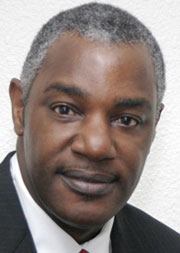

Mentoring works for Black males
By Edward Tolliver, Ph.D.
Black Male College Explorers Program Florida A&M University
No adult should shy away from mentoring “at risk” youth, especially African-American males. Through the years, little has been done to erase the enormous gap that separates Black males from the American mainstream. As markets and social conditions shift in the global economy, so does the competitive nature of those in it. Unfortunately, the greatest loser in the struggle is the Black male and the odds stacked against his chance at educational progress. In fact, National Assessment of Education Progress (NAEP) data consistently reveals the disturbing academic failings of the Black male. Furthermore, the Black-white achievement gap in Florida’s public school system reflects the inequalities found at the national level. So, if Fredrick Douglass was right and it really is “easier to build strong children than to repair broken men,” then mentoring at risk youth may prove to be the most palpable solution for improving the plight of Black men later in life.
The history of limited educational attainment unfavorably translates into the absence of employment opportunities, negative encounters with the judicial system and elevated Black male mortality. According to a 2008 Schott Foundation study “…the social, educational and economic outcomes for Black males have been more systematically devastating than the outcomes for any other racial and ethnic group or gender.” This study obviously reveals a disturbing trend for Blacks in general, but especially for Black males. Consequently, fewer African-American males graduate Florida high schools, or even go on to attend institutions of higher education. In addition, a disproportionally high number of Black males are enrolled in special education classes where the adolescent Black male is labeled a behavior liability. Also, many of these young men experience a prelude to lifelong failure as they become channeled into what some refer to as the “school-to-prison” pipeline.
these young men the chance to pursue a meaningful and productive life through a quality education is unwarranted. Although it is far from complete, the existing descriptive research amply demonstrates that Black males are at especially high risk of educational failure.
The Black-white achievement gap is apparent from the 4th grade onward, appears to widen through the 9th grade and then stabilizes partially as a consequence of disproportionately high dropout rates among Black students during the first two years of high school.
Mentoring Works
Since 1990, as evidenced by the tremendously triumphant 80 percent graduation rate of the Black Male College Explorers Program at Florida A&M University, participating “at-risk” Black male students 7th through 11th grade overcome academic obstacles in a positive and supportive college setting. Enrollees are immersed in rigorous, meaningful instruction, and mentoring, which engages them rationally, and is coupled with workshops, seminars, and motivational field trips. These young men immeasurably increase their chances of finishing high school. More importantly, many go on to pursue a college degree as well.
It is of vital importance that we provide mentoring assistance for these young men. This help should come in the form of understanding that mentoring is not easy nor will every attempt be met with success. The following tips, far from all encompassing, are intended to enhance results for the mentee as well as the mentor.
1. Accept as true that your mentoring involvement has immeasurable value.
2. Be an active listener without being judgmental.
3. Know that your reliability is a recipe to building and sustaining a positive relationship.
4. Understand your role as mentor and leave professional work to those responsible for it.
5. Set a good example of integrity in dealing with a mentee to establish a basis for future success.
Edward G. Tolliver, Ph.D. is the director of t Black Male College Explorers Program at Florida A&M University. Join Tolliver and associate professor of secondary education Rufus Ellis Follow @ FAMU_Living Well. Visit www.famu.edu/livingwell101.
Copyright ©2013. Florida Agricultural and Mechanical University Living Well 101/ All rights reserved. No portion of this document may be copied and/or duplicated without prior written permission of Florida Agricultural and Mechanical University.


Be the first to comment